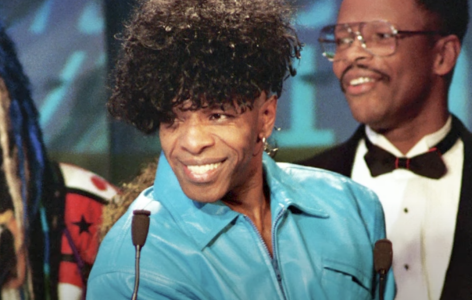Music pioneer’s passing marks the end of an era—What you didn’t know about the iconic Sly Stone
- Replies 0
The world of music has lost one of its brightest, boldest, and most influential stars.
Sly Stone, the visionary behind Sly and the Family Stone, passed away at 82, leaving behind a legacy that not only shaped the sound of a generation but also redefined what it meant to be a band in America.
For those who remember the first time we heard Dance to the Music or felt the electric jolt of I Want to Take You Higher, this is more than just the end of an era—it’s the closing of a chapter in the American songbook.
A Life in Full Color: From Texas Roots to San Francisco Soul
Born Sylvester Stewart in Denton, Texas, in 1943, Sly’s journey was as vibrant and unpredictable as his music.
Raised in Vallejo, California, Sly and his siblings were musical prodigies, mastering instruments from a young age.
By the mid-1960s, Sly was already a fixture in the Bay Area music scene, spinning records as a DJ at KSOL and producing hits for local acts. But it was his decision in 1966 to merge his band with his brother Freddie’s group that would change the course of music history.
Inspired by the local revolution that brought life to bands like Jefferson Airplane and Santana and the Grateful Dead, Sly and the Family Stone was born.

At a time when America was deeply divided, Sly assembled a multi-racial, multi-gendered group that looked like the future and sounded like nothing else. Their music was a joyous, infectious blend of funk, soul, rock, and pop, but it was also a call for unity, love, and social change.
The Soundtrack of a Generation
The hits came fast and furious: Everyday People, Hot Fun in the Summertime, Stand!, and the unforgettable Thank You (Falettinme Be Mice Elf Agin). These songs weren’t just chart-toppers—they were anthems for a new America, one that dared to dream of togetherness and equality.
Sly’s lyrics could be playful or profound, sometimes both at once. In Family Affair, he captured the complexity of family and society with a few simple lines, his voice equal parts grit and grace.
Their legendary performance at Woodstock in 1969 is still talked about today—a moment when music, hope, and history collided.
In 1969, Sly and the Family Stone became one of the most popular bands, performing a mindblowing set at the Woodstock Festival which marked their memorable rendition of I Want to Take You Higher.
And if you haven’t seen the band’s set in the Summer of Soul documentary directed by Ahmir “Questlove” Thompson, do yourself a favor and watch it. Sly’s energy, his towering Afro, and his flamboyant style were as much a part of the show as the music itself.
A Trailblazer in More Ways Than One
Sly and the Family Stone broke barriers not just with their sound, but with their very existence.
At a time when most bands were segregated by race and gender, Sly’s group was a living, breathing example of what America could be.

Trumpeter Cynthia Robinson and drummer Greg Errico were among the founding members, and their presence on stage sent a powerful message: music is for everyone.
Sly’s influence can be heard in the work of countless artists who followed, from Prince and George Clinton to the Red Hot Chili Peppers and beyond.
The funk revolution he helped ignite took the innovations of James Brown and launched them into the stratosphere, paving the way for decades of musical experimentation.
The Highs and Lows of Genius
But genius often comes with a price. By the early 1970s, the pressures of fame, internal band strife, and drug use began to take their toll.
The hits slowed, the tours dried up, and Sly’s life became increasingly troubled. Legal battles over royalties, periods of homelessness where he was reported to live in a van, and health struggles—including a long fight with COPD—cast a shadow over his later years. Sly won a $5 million judgment at one point for unpaid royalties but it was overturned later on.
Yet even as he receded from the spotlight, Sly’s legend only grew.
He made rare, electrifying appearances, like his surprise turn at the 2006 Grammy Awards, and his induction into the Rock & Roll Hall of Fame in 1993 was a reminder of just how much he had given to the world.
A Legacy That Will Never Fade
In 2023, Sly released his autobiography, Thank You (Falettinme Be Mice Elf Agin), offering a glimpse into the mind of a man who changed music forever.
Source: TIME / Youtube.
The book, like its author, is a bit of a puzzle—brilliant, elusive, and full of unexpected wisdom. As Sly himself wrote, “They’re trying to set the record straight. But a record’s not straight, especially when you’re not. It’s a circle with a spiral inside it. Every time a story is told, it’s a test of memory and motive.”
Sly’s family shared that he had recently completed a screenplay about his life, a testament to his enduring creativity and desire to tell his own story, in his own way.
They see Sly as a “a monumental figure, a groundbreaking innovator and a true pioneer who redefined the landscape of pop, funk and rock music,” one whose songs “have left an indelible mark on the world, and his influence remains undeniable.”

Did you ever see Sly and the Family Stone live? Do you have a favorite song or memory tied to their music? How did Sly’s message of unity and funkiness shape your own life? We’d love to hear your stories and reflections—share them in the comments below!
Rest in peace, Sly Stone. Thank you for letting us be ourselves—again and again.
Sly Stone, the visionary behind Sly and the Family Stone, passed away at 82, leaving behind a legacy that not only shaped the sound of a generation but also redefined what it meant to be a band in America.
For those who remember the first time we heard Dance to the Music or felt the electric jolt of I Want to Take You Higher, this is more than just the end of an era—it’s the closing of a chapter in the American songbook.
A Life in Full Color: From Texas Roots to San Francisco Soul
Born Sylvester Stewart in Denton, Texas, in 1943, Sly’s journey was as vibrant and unpredictable as his music.
Raised in Vallejo, California, Sly and his siblings were musical prodigies, mastering instruments from a young age.
By the mid-1960s, Sly was already a fixture in the Bay Area music scene, spinning records as a DJ at KSOL and producing hits for local acts. But it was his decision in 1966 to merge his band with his brother Freddie’s group that would change the course of music history.
Inspired by the local revolution that brought life to bands like Jefferson Airplane and Santana and the Grateful Dead, Sly and the Family Stone was born.

Sly Stone, the pioneering leader of Sly and the Family Stone and a major influence on pop, funk, and rock music, has died at the age of 82 after a long illness. Image source: Good Morning America / Youtube.
At a time when America was deeply divided, Sly assembled a multi-racial, multi-gendered group that looked like the future and sounded like nothing else. Their music was a joyous, infectious blend of funk, soul, rock, and pop, but it was also a call for unity, love, and social change.
The Soundtrack of a Generation
The hits came fast and furious: Everyday People, Hot Fun in the Summertime, Stand!, and the unforgettable Thank You (Falettinme Be Mice Elf Agin). These songs weren’t just chart-toppers—they were anthems for a new America, one that dared to dream of togetherness and equality.
Sly’s lyrics could be playful or profound, sometimes both at once. In Family Affair, he captured the complexity of family and society with a few simple lines, his voice equal parts grit and grace.
Their legendary performance at Woodstock in 1969 is still talked about today—a moment when music, hope, and history collided.
In 1969, Sly and the Family Stone became one of the most popular bands, performing a mindblowing set at the Woodstock Festival which marked their memorable rendition of I Want to Take You Higher.
And if you haven’t seen the band’s set in the Summer of Soul documentary directed by Ahmir “Questlove” Thompson, do yourself a favor and watch it. Sly’s energy, his towering Afro, and his flamboyant style were as much a part of the show as the music itself.
A Trailblazer in More Ways Than One
Sly and the Family Stone broke barriers not just with their sound, but with their very existence.
At a time when most bands were segregated by race and gender, Sly’s group was a living, breathing example of what America could be.

Rising to fame in the late 1960s and 1970s with hits like I Want to Take You Higher and Everyday People, Stone was celebrated for his innovative, multi-racial and multi-gendered band and his boundary-breaking sound. Image source: Good Morning America / Youtube.
Trumpeter Cynthia Robinson and drummer Greg Errico were among the founding members, and their presence on stage sent a powerful message: music is for everyone.
Sly’s influence can be heard in the work of countless artists who followed, from Prince and George Clinton to the Red Hot Chili Peppers and beyond.
The funk revolution he helped ignite took the innovations of James Brown and launched them into the stratosphere, paving the way for decades of musical experimentation.
The Highs and Lows of Genius
But genius often comes with a price. By the early 1970s, the pressures of fame, internal band strife, and drug use began to take their toll.
The hits slowed, the tours dried up, and Sly’s life became increasingly troubled. Legal battles over royalties, periods of homelessness where he was reported to live in a van, and health struggles—including a long fight with COPD—cast a shadow over his later years. Sly won a $5 million judgment at one point for unpaid royalties but it was overturned later on.
Yet even as he receded from the spotlight, Sly’s legend only grew.
He made rare, electrifying appearances, like his surprise turn at the 2006 Grammy Awards, and his induction into the Rock & Roll Hall of Fame in 1993 was a reminder of just how much he had given to the world.
A Legacy That Will Never Fade
In 2023, Sly released his autobiography, Thank You (Falettinme Be Mice Elf Agin), offering a glimpse into the mind of a man who changed music forever.
Source: TIME / Youtube.
The book, like its author, is a bit of a puzzle—brilliant, elusive, and full of unexpected wisdom. As Sly himself wrote, “They’re trying to set the record straight. But a record’s not straight, especially when you’re not. It’s a circle with a spiral inside it. Every time a story is told, it’s a test of memory and motive.”
Sly’s family shared that he had recently completed a screenplay about his life, a testament to his enduring creativity and desire to tell his own story, in his own way.
They see Sly as a “a monumental figure, a groundbreaking innovator and a true pioneer who redefined the landscape of pop, funk and rock music,” one whose songs “have left an indelible mark on the world, and his influence remains undeniable.”
Key Takeaways
- Sly Stone, the pioneering leader of Sly and the Family Stone and a major influence on pop, funk, and rock music, has died at the age of 82 after a long illness.
- Rising to fame in the late 1960s and 1970s with hits like I Want to Take You Higher and Everyday People, Stone was celebrated for his innovative, multi-racial and multi-gendered band and his boundary-breaking sound.
- Despite his musical legacy, Stone faced significant personal and financial struggles, including health issues, bouts of homelessness, and ongoing legal disputes over royalties.
- Stone's family honored him as a groundbreaking artist, noting that his music will continue to inspire, and revealed he had completed a screenplay about his life before his passing.
Did you ever see Sly and the Family Stone live? Do you have a favorite song or memory tied to their music? How did Sly’s message of unity and funkiness shape your own life? We’d love to hear your stories and reflections—share them in the comments below!
Rest in peace, Sly Stone. Thank you for letting us be ourselves—again and again.






